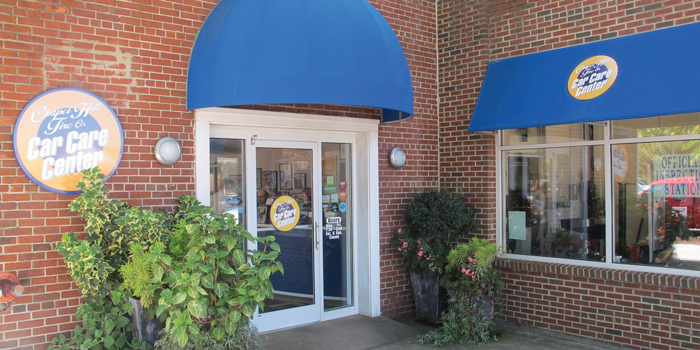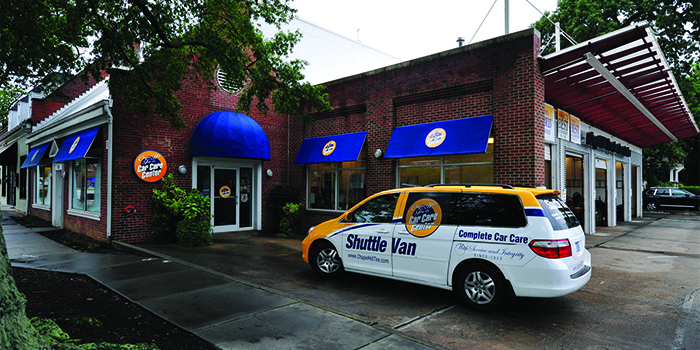Chapel Hill Tire Car Care Center is not a puzzle in either the literal or figurative sense. It is not confusing or an enigma, and the entire operation moves harmoniously and unconfusingly forward.
But it is the dealership’s almost magical ability to put often-divergent pieces together to deliver something beyond “world-class customer service” – and do so one customer at a time – that helps make it the winner of the 2012 Tire Review Top Shop Award sponsored by Ammco/Coats.
The nearly 60-year-old fixture in the college town of Chapel Hill, N.C., is not one-dimensional; it also is a leader in community involvement, training and expertise, branding and, most of all, environmental friendliness and sustainability. What is unique is how hard the management and employees work constantly to focus all of those elements back on building long-lasting relationships with customers.
Chapel Hill Tire’s history isn’t unfamiliar; it was a Top Shop Award Finalist in 2007, the very first year of the program and the only other time the company even entered the contest. It was founded in 1953 by Sion Jennings, who started in the tire and repair business in an old Studebaker dealership on West Franklin Street, which remains Chapel Hill Tire’s headquarters today.
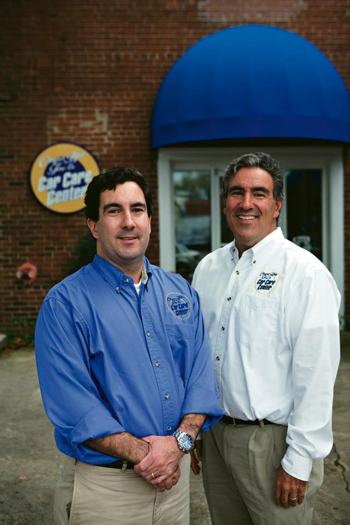 Jennings sold the business to Al Pons in 1964, and over 30 years he built it up to four stores that created opportunities for sons Britt and Marc and daughter Neill to graduate from college and attend graduate school. Britt worked side-by-side with his father, while Marc opted for a career with Chase in New York City and Neill became a wife, mother and successful executive with a company in Richmond, Va.
Jennings sold the business to Al Pons in 1964, and over 30 years he built it up to four stores that created opportunities for sons Britt and Marc and daughter Neill to graduate from college and attend graduate school. Britt worked side-by-side with his father, while Marc opted for a career with Chase in New York City and Neill became a wife, mother and successful executive with a company in Richmond, Va.
With the recession of the early 1990s, Al downsized, selling off three of the stores. He bought back one – Chapel Hill Tire’s Carrboro location – just before he died in December 1996 from complications from knee replacement surgery. His unexpected death was a dramatic turning point for both the business and the Pons siblings.
All of 26 at the time, Marc, who didn’t want to work at the dealership and be pegged as “the boss’ son,” came home to help keep both the business and his father’s memory alive by taking the reins of the dealership. Today, the siblings remain equal owners in the business; Marc has assumed the leadership role, and relies on Britt and Neill for advice and counsel. Britt heads up Chapel Hill Tire’s extraordinary customer service efforts and is heavily involved in community and promotion efforts. A cadre of outside advisors, including some who worked with their father, often are consulted for input or to serve as sounding boards.
While Britt easily blended into the business, Marc had a tougher time earning respect and, more importantly, learning to coach (not manage) others. He understood the black-and-white business side, but struggled to relate to employees who were loyal to his father and mourned his passing as much as the family.
The transition was hard, but those tough times laid a solid foundation for what was to come, both internally and externally.
Tracking Customers
The easiest thing to understand – because it is the most obvious – is that from the top down and in either direction, no one at Chapel Hill Tire takes a customer for granted. Not a first-timer, and never a long-time client.
It doesn’t help that Chapel Hill Tire is in a tough, ever-shifting market covering Carrboro and Chatham Counties. Chapel Hill is home to the University of North Carolina – and is one of the three points in the Research Triangle region of the state. Sided by nearby Raleigh, with North Carolina State University, and Durham, with Duke University, the Triangle is home to dozens upon dozens of top-flight corporations, research firms, medical centers and, well, top universities.
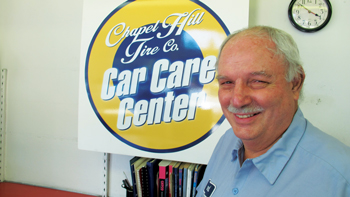
It is very much an upper-middle/upper income area that also hosts tens of thousands of college students for nine months of the year; Chapel Hill itself has a permanent population of around 35,000, which tops 60,000 when UNC is in session. So what you have is a continuing group of high-income, demanding regular consumers mixed with a transient low/no-income group that still needs vehicle service and tires.
Marc says readily that college students are not their target audience, and UNC makes it difficult for local companies to reach out to professors, support staff and administrators, so strong word-of-mouth is about the only way in at the school. No such restrictions exist in the rest of the world, and Chapel Hill Tire aggressively pursues through the usual promotional channels, as well as approaching local companies with special offers for their employees.
The front end of the process of reaching possible customers is comparatively easy; the effort to maintain and nurture them is quite akin to gardening.
Customer service to Chapel Hill Tire starts with creating a “great place to work because we respect our employees, treat them like family and provide them opportunities to learn, grow and prosper;” being honest with “customers and ourselves;” admitting “mistakes and doing our level best to fix them promptly;” and getting better each and every day.
“We want to build long-lasting relationships with our customers,” says Marc. Words like ‘honest,’ ‘trustworthy,’ ‘convenient,’ ‘professional’ and ‘friendly’ show up consistently when you read our reviews and testimonials.”
Those reviews and testimonials are really the key driver for Chapel Hill Tire’s customer service system. Because you can’t fix what you can’t see, the dealership is “relentless and passionate” about getting honest feedback from all customers.
New customers get a personal phone call from Britt, who does a quick survey with them, collects input and thanks them for coming to Chapel Hill Tire. If the customer expresses a concern, the store manager is called and the situation discussed. Regular customers get an e-mail “thank you” follow-up and short survey. If their e-mail addresses isn’t in the database, they get a call from Britt.
Chapel Hill Tire works very hard to gather feedback and contact information from each and every customer. It enjoys a high success rate of capturing e-mail addresses by offering a free VIP newsletter with coupons and important vehicle care information.
All of the feedback – whether by phone, through post-visit surveys or off of Chapel Hill Tire’s website – is compiled and analyzed. While trends are important, Marc says, even the slightest hint of a problem is addressed quickly. One main outcome of all of this is to be “sticky” for all customers. “We want them to continue to come to Chapel Hill Tire and we want them to promote us to their friends and families,” says Britt.
Constantly tracking customer service grades allows the dealership to stay ahead of problems and see why, when and how grades improved or fell. Scores are shared with store managers and service advisors to “reinforce the desired behavior and result,” Marc says.
Chapel Hill Tire utilizes the Net Promoter Scoring (NPS) system to “measure our effectiveness at building customer loyalty.” Customers who specifically say they would recommend Chapel Hill Tire to others are considered as “promoters.” The metric weighs that group against those deemed as “detractors.”
“A score of 50% is considered excellent,” Marc says. “Our net promoter scores average 70% across our four locations. The key is to ‘deserve’ recommendations – to earn ‘promoters’ – instead of expecting recommendations as function of business.”
Scores and comments are posted at each store “so that our employees can see how we are doing and to let them share in the satisfaction that we are executing well,” Marc says. “Service advisors receive regular positive feedback via the NPS system. Managers go out of their way to praise advisors for jobs well done so that we are positively reinforcing the right behaviors.”
“The NPS does a great job galvanizing everyone into a culture of ‘Yes’ in meeting customer needs and desires,” he says.
Constant Quality
Chapel Hill Tire also builds great value by standing behind its products and services. The four stores offer Michelin, Uniroyal, Capitol and Negotiator brand tires, and customers receive free lifetime flat repairs, rotations and balancing. Service parts are backed by a two-year/24,000-mile warranty.
“Even if the parts manufacturer will no longer warranty the part, we will stand behind it,” he says. “It’s our job to pick the best parts we can, not the customers’.”
Each store has its own Quality Control Committee, led by the service manager and including a service advisor, senior tech and a general tech. Each week the QCC team meets to review any rechecks from the week before, and looks for ideas “to implement and improve the quality of our products and services.” Monthly, the QCC teams from all the stores gather to share successes, challenges and the new initiatives they are working on.
Weekly store manager meetings and monthly gatherings of managers and service advisors provide another level of knowledge sharing and intelligence, and allow the company to move quickly and efficiently to implement change. For instance, a few years ago hybrid cars started popping up all over the city, primarily Toyota Prius and Honda Civic models. Not wanting to cede service work to car dealers, Chapel Hill Tire started sending key techs to hybrid service training programs and invested in necessary equipment.
“Last year we achieved the first hybrid service certification in the Triangle area from the Auto Career Development Center,” Marc says, “the most rigorous hybrid training available. Eight of our technicians have achieved certified status through ACDC.”
ASE certification also is a must, and each location has at least one ASE Master Certified Technician. All service techs have at least three ASE certifications, and take advantage of after-hours training put on by Advance, O’Reilly’s, NAPA and Carquest.
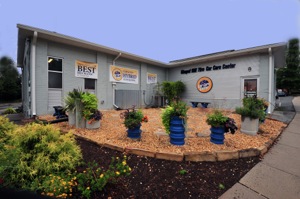 Service advisors also get extensive training on Michelin and Uniroyal products, and stay up to date on the latest industry trends. “We also work with CAI, a local training and HR assistance company, for service advisor and management training,” Marc says. “And later this year we will work with R.L. O’Connor with their online webinars for service advisors.”
Service advisors also get extensive training on Michelin and Uniroyal products, and stay up to date on the latest industry trends. “We also work with CAI, a local training and HR assistance company, for service advisor and management training,” Marc says. “And later this year we will work with R.L. O’Connor with their online webinars for service advisors.”
The stores themselves carry very little inventory, focusing on key sizes based on customer demand and research. With a market area that is “too varied, with a lot of unusual sizes,” the dealership relies on American Tire Distributors (85%) with twice-daily deliveries, as well as the local TCI warehouse (15%).
Besides the original West Franklin St. store, Chapel Hill Tire has one in Carrboro (the one they owned, sold and bought back), another in a converted grocery store that opened in 1999, and its crown jewel, a purpose-built tire store that opened this past December.
Until the last few years, the five service bays at the original store had only a roof and one wall, leaving the techs exposed to the elements. Now the well-kept and clean store has proper walls and bay doors. Just across the street is a second building, an extension of the West Franklin St. store that provides four more bays and much needed customer parking in a squeezed downtown area.
Down the road, the Carrboro store, built around 1905, sits on an oddly shaped and hilly lot, making maneuvering a bit of a trick. But the 8-bay location is also an eye (and sun) catcher, with a beautiful front-facing garden and a roof full of solar panels.
The garden is a huge hit with customers and local residents, many of whom drop in to ask about it. Professionally tended, the garden features planters made of used steel car wheels that have been cut and welded together, benches with legs of halved wheels, and a privacy screen/trellis assembled from wheel bits that encourages plants to help block the view of an air conditioner. The store also collects rain, used to water the expansive garden.
The solar panels not only provide 15 kilowatts of juice for the store, they allow Chapel Hill Tire to realize a modest $400 profit from selling excess electricity back to the local generator.
The Cole Park Plaza location, a rehabbed grocery store, is large by tire store standards, but the strip mall location gives Chapel Hill Tire excellent exposure. It, too, has eight bays with above ground lifts and the latest mounting, balancing, alignment and diagnostics equipment.
Opened this past December, the Woodcroft store is one of the only tire shops in North America with a garden for a roof. The company’s only purpose-built store, it features eight spacious service bays and a living roof that provides beauty and insulation, and makes a clear statement about Chapel Hill Tire’s green aspirations.
Designed and installed by local firm Spring Brand Landscapes, the roof was created to look good all year, even as plants bloom and change color through the seasons. The green roof system is pretty much self-sufficient, Marc says, and the 38 unique plants add to the architecture of the building.
And it attracts the attention of passers-by and locals, who often stop in to comment about the rooftop arrangement and ask questions about the plants. Because the service advisors are really good at cars but not at horticulture, Chapel Hill Tire created a handout that talks about the roof garden and lists each of the varieties on the roof.
The stores are open Monday-Friday from 7:30 a.m. to 5 p.m.; Saturday hours were ended a few years ago to allow the company’s 45 employees time for their families and communities. Free shuttle service at each store comes from a fleet of well-branded hybrid minivans and friendly drivers that will take customers to work or back home while their vehicles are being worked on.
Welcoming Environment
To walk into a Chapel Hill Tire store, one wouldn’t think they were in a tire shop. There are no displays at all. No tires, no wheels. About the only hint of tires is a glimpse of Bibendum on a wiper blade display.
Instead, the showrooms are well-branded, and that label clearly says: ‘Chapel Hill Tire Car Care Center.’ Wall posters talk about the dealership – either through framed historic photos of Chapel Hill Tire or modern outlines of the company’s customer-first philosophy, service and maintenance offerings, warranties and guarantees.
If customers want to see the tires, we’ll bring them out, says Britt. Otherwise, tire options are shown on-screen at one of the multiple neat-as-a-pin service advisor stations at each store.
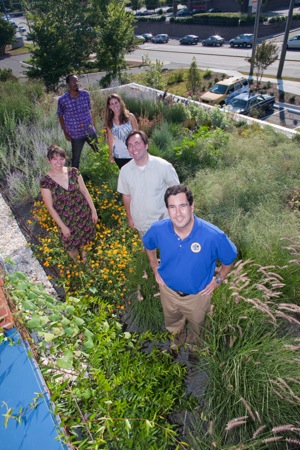
Not having tire and wheel displays makes life simpler, Marc says. Nothing to dust and clean, no missing tire centers or center caps, no taking up valuable floor space from comfortable, cozy open space. Each store has a pleasant, but not over-done waiting area with up-to-date magazines, comfy chairs, a TV, free coffee and free WiFi. The smaller showrooms give the stores a more intimate, friendly feel, while the uncluttered front counters have a high-tech professional look.
The company’s muted yellow and blue color scheme is somewhat derived from its former life as a died-in-the-wool Goodyear dealer. About seven years ago, explains Marc, the dealership decided to move away from Goodyear.
“We freelanced brands for a while,” he says, pulling product from Pirelli, Kumho, Continental and others. A few years ago, they settled on Michelin and Uniroyal as their primary brands. “They fit our market and where we wanted to be,” he says.
Chapel Hills Tire’s main auto service competition is the local car dealers (“They are doing better with tires, too,” he reminds.) and a handful of independent service shops. On the tire side, there are three Bridgestone Americas stores, a Walmart, a handful of other independent dealers, a Merchant’s Tire & Auto Center location, Midas and Precision Tune stores and seven Discount Tire stores.
‘Green’ Leader
The hybrid-driving brothers are very proud of the business’ green footprint in Chapel Hill. The gardens, roof, rainwater collection and recycled wheels, coupled with product offerings of environmentally-friendly oil changes using 100% re-refined motor oil and fuel-saving nitrogen tire inflation, helped Chapel Hill Tire become the first Green Plus-certified tire and auto repair business in the country. Green Plus is an education and certification non-profit organization operating in 15 states that provides a platform for small and mid-sized businesses seeking best practices and certification on green and sustainable practices.
As Tire Review was in town gathering information for this story, Chapel Hill Tire was named “For Profit Business Leader of the Year” in the Triangle Business Journal’s 2012 Clean & Green Awards, honoring local companies for their leadership employing and demonstrating effective green strategies.
“We’re the first auto repair facility in the Triangle area – maybe in the country – to make carbon offset donations on behalf of customers,” Marc says. “To date we’ve mitigated more than 800,000 pounds of carbon for our customers – the equivalent of planting more than 60,000 trees!
“And we were the first independent tire facility in the Triangle to voluntarily stop using lead wheel weights, and the first hybrid-service certified independent repair shop in the Triangle.”
That green strategy envelops everything: from dual flush toilets, skylights and high efficiency fluorescent shop lighting to motion sensor lighting, hand dryers in bathrooms and reused building materials, Chapel Hill Tire is a model of green.
And the company proudly posts its environmental scorecard on its website.
Sense of Pride
As Chapel Hill natives, Britt and Marc are very proud of their roots and are active in the community. They share duties with the Chapel Hill-Carrboro Chamber of Commerce, The Foundation for a Sustainable Community, Green Plus, the East Chapel Hill Rotary, Garage Owners of North Carolina, and the Association for Corporate Growth.
Over the past two years, Chapel Hill Tire has donated some $100,000 to local charities and non-profits, most focused on children like the Michelin soccer ball program, and local arts and youth sports programs. The dealership also partnered with the Cora Food Pantry to help kick start the Porch Pick-up Program, a neighborhood program where an email is sent out outlining needed food items and pick-up days.
All of those customer service, training, environmental, marketing and community outreach efforts have added up. Chapel Hill Tire was named 2010 Citizen of the Year by the Chapel Hill Carrboro Chamber of Commerce; earned 2011 and 2012 Chapel Hill News Rose Awards for Best Auto Repair Facility; 2011 and 2012 Indy magazine readers choice awards for Best Auto Mechanic; 2011 Chapel Hill magazine readers choice award for Best Auto Repair; 2010 Green Plus Champion at the North American Sustainable Enterprise Awards; and, of course, being selected as a 2007 finalist in Tire Review magazine’s Top Shop Award.
When asked why Chapel Hill Tire didn’t enter when it became eligible again in 2010, Marc says, “We knew we weren’t ready. Being a Finalist in 2007 was great, but we knew to win we had a lot of work to do.”
Those diligent efforts truly did pay off. One customer at a time.
To see more photos of Chapel Hill Tire Car Care Center – as well as this year’s finalists – click here.

